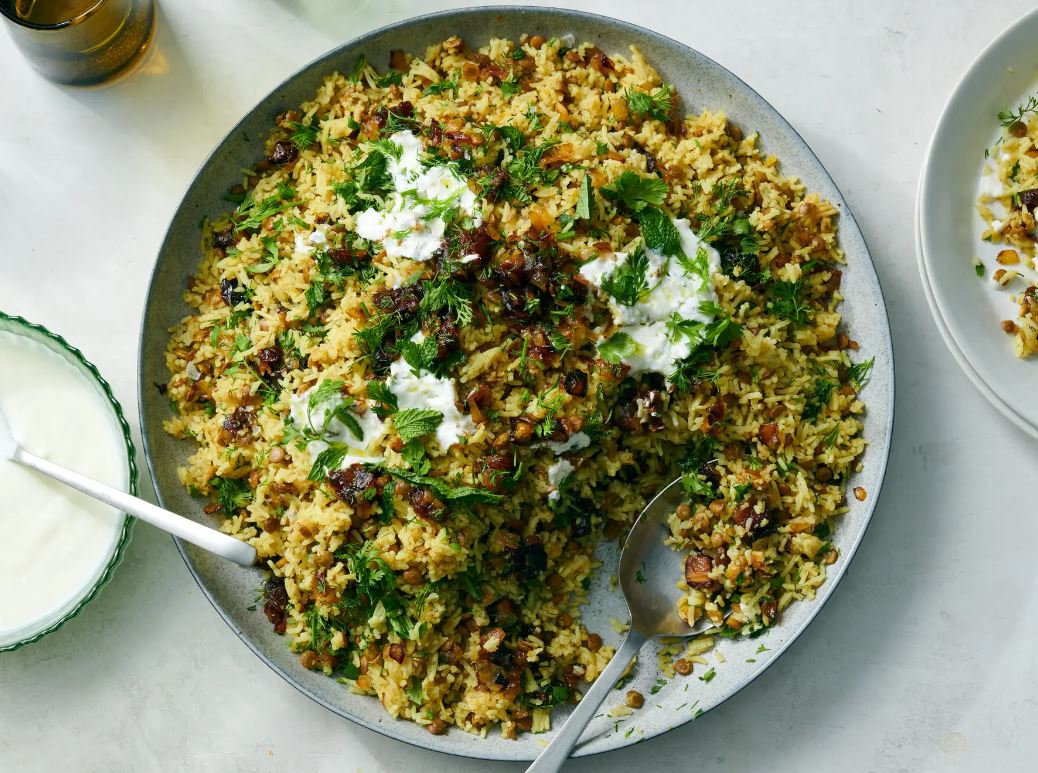The harmonious blend of lentils and rice has long been cherished as a cornerstone of comfort food across diverse cultures worldwide. From the South Asian delicacy of khichdi to the Middle Eastern mujadara and the Greek fakorizo, this humble combination transcends borders, offering a thrifty, nourishing, and endlessly versatile dish that sparks creativity in countless kitchens.
For Nasim Alikhani, the proprietor of Brooklyn’s Sofreh restaurant, lentils and rice evoke memories of her hometown Isfahan, Iran. Arriving in New York at the age of 23, Alikhani brought with her the cherished recipe for adas polo—a dish that sustained her through her early years in the U.S. “It was my budget meal for those first years in the U.S.,” she reminisces. Simple yet satisfying, adas polo—comprising lentils, rice, and onions—was a staple during her student days and later became a cherished family meal as she embraced motherhood.
As Ramadan approaches, adas polo takes on added significance as a staple for breaking the fast. Alikhani recalls her family’s tradition of preparing hundreds of containers of the dish for distribution as an act of charity during the holy month—an embodiment of the communal spirit that defines Ramadan. “It’s what you serve when you want to feed a lot of people,” Alikhani reflects, underscoring the dish’s capacity to nourish both body and soul.
What makes adas polo truly remarkable is its adaptability, accommodating a spectrum of variations to suit individual tastes and preferences. Some enthusiasts introduce lamb or beef, while others incorporate elements like crispy tahdig created by layering lavash or potato slices at the pot’s bottom. Dried fruits such as apricots, prunes, raisins, and dates infuse sweetness, while nuts add texture. At Sofreh, Alikhani elevates the dish with a touch of saffron and rose water-scented clarified butter, imparting a subtle aroma that tantalizes the senses.
However, Alikhani’s heart remains with the more minimalist version of adas polo—the one she prepares at home. Here, she opts for simplicity, simmering lentils and rice with a hint of turmeric and cinnamon. The dish is then layered with caramelized onions, butter-warmed dates, and a sprinkling of fresh herbs, creating a symphony of flavors and textures. A dollop of yogurt and, on occasion, a fried egg complete the ensemble, transforming it into a wholesome meal in its own right.
“At the restaurant, I have to fight with people not to eat it with the fesenjan or beef stew,” Alikhani remarks with a chuckle. For her, adas polo shines brightest when savored in its purest form, unadorned by accompanying dishes. It is a testament to the dish’s innate ability to captivate palates and foster a sense of connection—to one’s roots, to cherished memories, and to the shared experience of breaking bread together.
In a world marked by culinary diversity, adas polo stands as a timeless embodiment of the universal appeal of comfort food—a dish that transcends cultural boundaries to unite communities and celebrate the simple joys of nourishment and togetherness. As Alikhani continues to share her cherished recipe with patrons at Sofreh and beyond, she invites us all to savor the beauty of adas polo and the rich tapestry of flavors it embodies.

